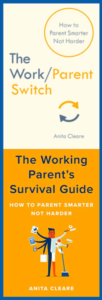Why positive parenting makes you happier
A key principle of positive parenting is noticing the good stuff and trying to make a bit more of it happen. For children, this can have a truly transformative effect. When parents notice what their children are getting right (rather than focusing just on what they are getting wrong), children tend to do more of that good behaviour. They get more stuff right, a virtuous circle. But focusing on the positives also has a powerful effect on parents too. When we look for what our children are doing well, we notice more and more of what they are doing well. Our viewpoint becomes a little rosier and we become more content and satisfied with our children and ourselves. Practising positive parenting makes you happier.
Positive psychology is all about understanding what makes life feel worthwhile so that we can do more of it. It focuses on positive experiences, states and traits and asks how we can create more of these in our lives to optimise our wellbeing and happiness. Sounds simple, doesn’t it! But positive psychology becomes a bit trickier when it comes to parenting. Because parenting is not just about the feelgood factor. Parents have a responsibility to help children learn the skills they need to be successful adults. And that inevitably involves setting boundaries and responding when children get it wrong. Parents can easily get sucked into focusing too much on children’s misbehaviour. And that’s when parenting slips into a negative rut of constant battling, shouting and cajoling. Which is a very miserable place to be.
By providing a route out of that trap, positive parenting makes you happier.
According to the godfather of positive psychology Martin Seligman, “Insufficient appreciation of the good events… and overemphasis of the bad ones are the two culprits that undermine serenity, contentment, and satisfaction.” (Authentic Happiness)
Insufficiently appreciating our children’s good behaviour and overemphasising the bad behaviour undermines our satisfaction with life in general and especially decreases our satisfaction with our children and with ourselves as parents. When we focus on the times our children get things wrong, we quickly lose perspective and drift into ‘always’ and ‘never’ statements. My son never listens to me. My daughter always has a tantrum. Sound familiar?
The first thing I ask parents to do is to think of examples when their child didn’t do that thing (and there always are examples). The first step is to realise that this misbehaviour does not happen 100% of the time, even if it feels that way. And when you start focusing on the times that the misbehaviour didn’t happen, on the times when the children got it right, on catching them being good, then the question becomes how can I help my child to do that desirable behaviour more often? Rather than, how can I stop the bad behaviour, how can I be a better parent, or how can I change my child?
So if you find yourself in a bit of a negative place in parenting, caught up in the bad behaviour and overwhelmed by how to cope with it, try a quick gratitude exercise. Sit down for five minutes and think very specifically about the good things your child has done that week. Think about their most lovable traits and habits. Dwell on those moments and allow the positive emotions to circulate through you. It’s a good feeling.
And when you are done with enjoying the feelings, ask yourself a question “I wonder what I could do to help those positive traits and habits shine more brightly and more frequently?” Focusing on the good stuff helps you find a way forward with your child’s behaviour. And it also significantly boosts your own joy and happiness quota. Leaving you feeling a lot more satisfied with your family life.
This post contains an affiliate link to Amazon, which means that if you click through from here to view Martin Seligman’s book Authentic Happiness and make a purchase, I receive a small commission. I highly recommend this book but please feel free to purchase it anywhere you want. Or you might find it in your local library. For more info on how I work with advertisers, read my full Disclosure Notice.






